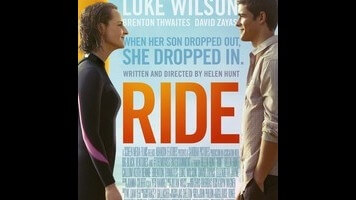Helen Hunt writes and directs herself into a corner with Ride

Back in her Mad About You days, Helen Hunt seemed like a natural fit for the lead in a Woody Allen movie. When her shot finally came, she got stuck doing half-speed screwball in Allen’s Curse Of The Jade Scorpion. Certain elements of Ride, Hunt’s second feature as a writer/director, seem designed to give her another try in that rarified (and somewhat fantastical) world. She plays Jackie, a neurotic New Yorker with a Woody-ish wisecracking disdain for Los Angeles. That disdain gets a workout when Jackie’s son Angelo (Brenton Thwaites) visits the west coast before his freshman year in college and, once there, decides to drop out of school and pursue surfing. Before Angelo sets out for California, the movie establishes his ongoing dialogue with Jackie as naggy, fast-paced, repetitive, overlapping, and, finally, exhausting; even their text messaging is impossibly rat-a-tat. Hunt’s writing isn’t exactly knocking off Woody Allen (her characters do send text messages, after all), but it shares with Allen a peculiar, stylized imitation of how New Yorkers supposedly sound.
The strange, staccato rhythm of the dialogue carries over to the movie’s storytelling. For a plot that seems to exist primarily as an excuse to get Jackie taking surfing lessons from the mildly irritated Ian (Luke Wilson) and eventually begin healing a tragic event from her past, Ride goes through a rigmarole of motivations and backstory. There’s Angelo’s aspirations as a young writer, Jackie’s testy support of his career and knowledge of the publishing industry, and Jackie’s hastily introduced belief that she will prove something to her son by horning in on his hobby. The surfeit of plot makes this relatively intimate movie feel busier and knottier than it needs to be. Some scenes begin abruptly before playing out at length; introductions of key character traits, like Angelo’s love of surfing, are confusingly underplayed. The movie also has an uneven sense of time passing; at one point, Jackie completes a cross-country round trip in about 45 seconds of screen time.
Technically, most of this proceeds smoothly; on a writing level, it’s something of a mess. The movie represents Hunt’s first solo original-screenplay credit. Her 2007 directing and co-writing effort, Then She Found Me, was adapted from a novel, and Ride has more novelistic touches than most 90-minute movies (which is to say, probably too many). It’s also spikier and more ambitious than either a typical drama about an older woman getting her groove back or a typical comedy about an overbearing mother, both of which it resembles at different points. But by stringing so many ideas about writing, editing, surfing, and familial dysfunction onto a potentially simple story, Hunt loses track of her through-line, which takes a particular toll on the dramatic material.
The thick muck of screenwriting doesn’t leave much room for the performances, including Hunt herself, who feels more at home with the motormouthed New Yorker half of her part than Jackie’s status as a high-powered editor who spends a disproportionate amount of time answering grammar queries. The movie tries to assign Thwaites equal importance—he gets some scenes without Hunt—but his character seems more invested in sniping with his mom than either of his actual passions. Scene by scene, Ride avoids plenty of clichés, especially in Hunt’s relationship with Wilson, the significance of which is thankfully never overstated. But by the end, it also avoids making much sense.